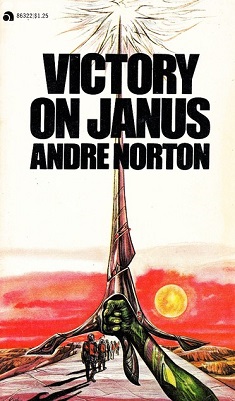
Victory on Janus
Andre Norton
190 pages
published in 1966
In Judgement on Janus we met Naill Renfro, forced labourer on the planet Janus who through handling a carefully planted treasure trap is transformed into one of the Iftin, the green skinned ancient and long dead native race of forest dwellers that lived there thousands of years before humanity came to the planet. With it came the memories of Ayyar, a warrior scout from the last days of the Iftin. Having found other changelings Naill-Ayyar made it to the safety of one of the dead tree-cities of the Iftin, there to hibernate through winter.
But their slumber is interrupted by a new menace. The human settlers of Janus, dour religious people calling themselves garthmen had been waging a war against the unending forest of Janus for as long as they’d been there, but now it had entered a new pitch. No longer a struggle by individual garthmen to hew out a living from the forest, the whole planet had united and was now waging a mechanised war on it. This wasn’t about making land fit for farming, this was pure destruction, a war fought as Ayyar finds out, to protect against attacks from the green skinned devils coming out of the forest to attack and destroy holdings. Yet as far as they know, the small band Ayyar is part of are the only Iftin left on the planet, so where are these new ones coming from?
It soon turns out it’s the work of the Iftin’s old enemy THAT, an ancient evil that Ayyar remembers fighting in the last days of Iftin rule of Janus. That evil, bound to a wasteland of its own making, has woken up again as the changelings moved into the forest. Now it’s broadcasting its persuasion rays all over Janus, drawing in men and machines on the planet to form an army, an army gathered together for some purpose, but what? To find out Ayyar has to penetrate the heart of the THAT’s stronghold, face the various dangers on the way as well as those that await him inside.
Victory on Janus therefore looks a lot like a fantasy quest story, but as Naill-Ayyar comes closer to his goal, it takes a turn for the Lovecraftian. As Norton slowly drops the clues to the real nature of THAT, I couldn’t help but get a twisted sort of sense of wonder at the scale of time and power revealed, similar to that you get from some of Lovecraft’s cosmic revelations. THAT is no fantasy evil, but technology twisted to an intent unclear to its opponents, operating with neither anger nor hatred towards its victims, just grim purpose. What’s more, Norton leaves the possibility open that IT is in fact only evil in the eyes of the Iftin, that their revulsion of the strange, of the intruders on their planet is perhaps more xenophobic than it seems at first.
Though Norton knows better than to completely reveal it, it is clear that the history of Janus and the Iftin isn’t quite what it seemed at first, but longer and stranger than the incomplete memories of the changelings indicate, with THAT at the heart of it, existing for as long if not longer.
Victory on Janus is the first Norton novel that triggered in me the sense of cosmic awe that’s at the heart of science fiction, or at least one view of it. She usually keeps that sense of scale and age in the background, while the stories she shows play out on a more human scale. Here though that awe is at the centre of the story, with Ayyar only a pawn in a game of godlike intelligences. It’s a departure for Norton and one I appreciated.
No Comments